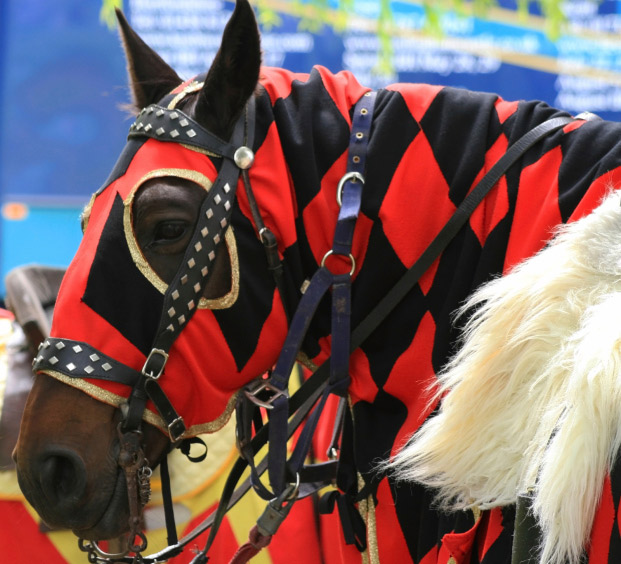
Campdrafting
- Australian Bushmen's Campdraft and Rodeo Association
- Australian Campdraft Association
- Campdrafting
- Southern Campdrafting Association
Cavalry
Competitive Trail Riding
Drill Team
Endurance
- American Endurance Ride Conference (AERC)
- Arabian Horse Distance Riding Association
- Endurance Ride Association of South Africa
- Gold Country Endurance Riders Club
- Pacific Northwest Endurance Rides
- Scottish Endurance Riding Club
- Southeastern Association of Trail Riders
- Southeastern Endurance Riders Association
- Swiss Endurance Riding Association
- United Arab Emirates Equestrian and Racing Federation
- Upper Midwest Endurance and Competitive Rides Association
Gymkhana
- California Gymkhana Association
- Los Vaqueros Gymkhana Club
- Manitoba Gymkhana Rodeo Association (MGRA)
Horsepulls
Jousting
- International Jousting Association - USA
- Maryland Jousting Tournament Association
- Medieval Times, NJ (Events include Jousting)
- National Jousting Association
- Scotfest Jousting
- Society of Tilt and Lance Cavalry
- The Renlist (Renaissance Fairs which include Jousting)
Modern Pentathlon
- British Pentathlon
- Cambridge University Modern Pentathlon Club
- Modern Pentathlon Australia Inc.
- Modern Pentathlon Sweden
- Union International de Pentathlon Moderne
- USA Modern Pentathlon
Mounted Archery
Mounted Games
- Mounted Games Across America, Inc. (MGAA)
- The Mounted Games Association - Great Britain
- United States Mounted Games Association (USMGA)
Mounted Orienteering
Mounted Shooting
- 1st Ohio CMSA
- 1st Virginia CMSA
- Cowboy Mounted Shooting Association
- Mounted Shooting World
- Texas Shooting Horses
Polocrosse
Quadrille
Ride and Tie
Side Saddle
- American Sidesaddle Association
- International Side Saddle Organization (ISSO)
- NEA Sidesaddle Association
- The Side Saddle Association, UK
Team Penning
Tent Pegging
Vaulting
- Equestrian Vaulting Australia
- Equestrian Vaulting USA
- Fachschule Voltigieren
- KNHS Voltigevereniging
- Sydney Vaulting Group
- Thiers Voltige
- Vaulting World
- Vaulting: Gymnastics and Dance on Horseback
- Voltige Auvergne
- Voltigevereniging Den Helder
- Voltigierschule Allgäu
Western Dressage
- California Western Dressage Association
- Cowboy Dressage
- Cowboy Dressage World
- Dancing Horse Farm
- Horsemen's Western Dressage
- Jack's Learning Circle
- Kathleen Elliott Equestrian Training
- North American Western Dressage
- Northern Arizona Chapter of Arizona Dressage Association
- Oregon Cowboy Western Dressage Alliance
- Palm Partnership Training
- Western Dressage Association of America (WDAA)
- Western Dressage Association of Australia
- Western Dressage Association of Colorado
- Western Dressage Association of Georgia
- Western Dressage Association of North Carolina
- Western Style Dressage Association of Canada
Working Equitation
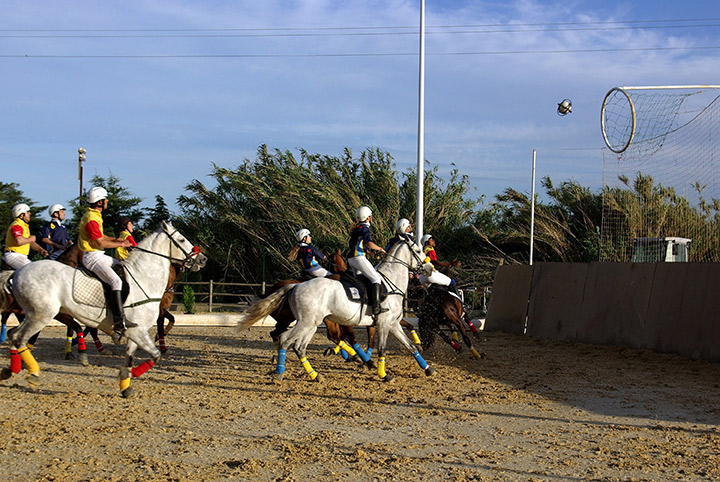
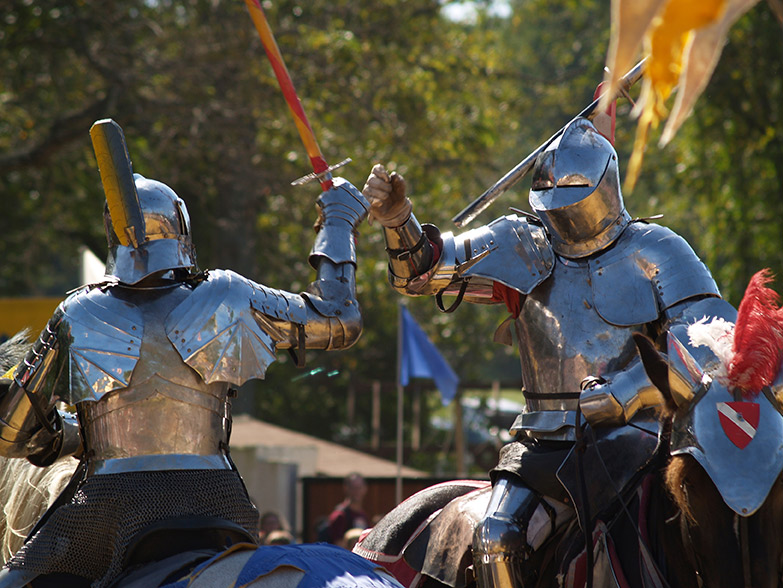
Steal the Thunder
by Will Bardenwerper
Indian relay racing is sometimes called America's first extreme sport. For years, the Brew Crew - team from the Pine Ridge Reservation in South Dakota - were a dominant force. Then tragedy struck. This is the story of the Lakota's spiritual relationship with the horse, and a quest to regain glory on the track.
On the Pine Ridge Indian Reservation in South Dakota, you hear it again and again: “There will never be another Hermis Tall.”
Hermis was the greatest Indian relay rider of his generation, a natural horseman who led a team of Oglala Lakota to three consecutive championships at the sport’s marquee event, held every summer in Sheridan, Wyoming. The sight of him thundering bareback across the finish line - astride a 1,200-pound thoroughbred, shirtless, his chiseled physique glistening with sweat - will forever be ingrained in the minds of his teammates, friends, and rivals. His team, known as the Brew Crew (a nod to the last name of their captain, Stan Brewer), racked up a remarkable 19 wins during the summer of 2015 alone, making them Indian relay’s dominant force, the subject of envy and occasional resentment over Hermis’s aggressive riding tactics.
There’s no reason to resent Hermis Tall anymore. His picture is now attached to a wooden cross, marking his grave site on a lonely, windswept reservation bluff. He lies next to his brother Earl, not far from the overcrowded family trailer where he grew up and lived for most of his life, much of which he spent on horseback.
Hermis may be gone, but the story he started isn’t over. It’s the story of the team he left behind, of their struggle to overcome heartbreak and adversity on and off the track, and of their attempt to once again find glory in the powerful union of man and horse.
Steals the Thunder, a brown and white paint horse, and his 25-year-old rider, Brian Beetem, are a blur as the jockey whips around the far turn at the county fairgrounds in Sheridan. The horse’s muscles glisten in the rising sun as Brian, an Oglala Lakota who’s riding bareback, crosses the finish line, slowing to a trot under the gaze of Stan Brewer.
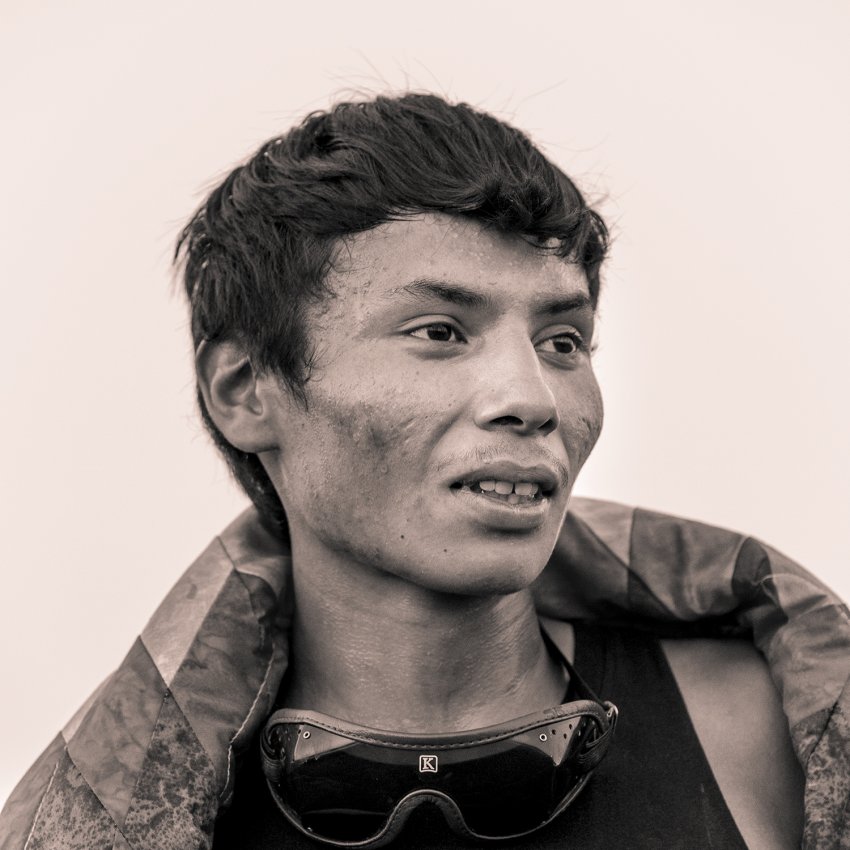
On this mid-July morning in 2018, with the Bighorn Mountains jutting into scattered clouds beyond the western grandstands, Brian is exercising horses that the Brew Crew brought here from Pine Ridge. The riders are getting ready to compete in the Indian relay championship in Sheridan - a race widely regarded as the sport’s world championship - which starts tonight as part of a major western event, the Sheridan WYO Rodeo.
Stan, 28, is a Lakota tribe member who’s been riding for nearly as long as he could walk. He’s joined in Sheridan by his wife, Ella, and their two boys - his “road warriors” - Parker, three, and Kye, seven months.
Records of Indian relay racing can be found in early-20th-century western newspapers, though Native American tradition suggests that the sport goes back much further. At the start, jockeys stand beside the first of three horses that they’ll mount and ride for one lap each. Generally, five teams compete at the same time, which means there can be a wild jumble of horses and men on the track. (Three teammates are responsible for controlling the waiting relay horses and helping with the often frantic dismounts.) At one point during this week, an announcer will try to describe the anarchic quality of the races over the rodeo’s PA system. “Nothing is certain in Indian relay,” he’ll say in a Wyoming drawl. “The only thing certain is that the sun will rise in the east and set in the west.”
Teams can earn up to $10,000 for winning, but these races offer something more valuable. For the Brew Crew, and for most of the 20 Native American teams that travel to Sheridan from reservations all over the Great Plains and Rocky Mountains, the events provide an escape from the stress of reservation life. “You race for the love and hope to break even,” Stan says.
The day before, Stan loaded his family, three teammates, and five horses into a truck and trailer for the five-hour drive from Pine Ridge to Sheridan. Stan’s kids were well-behaved as they traversed the lonely Powder River Basin, though Parker’s demands to listen to John Cena’s WWE entrance theme on repeat nearly drove Ella crazy. “I am so over that song,” she says with a laugh. Still, it was an easy commute by the standards of Indian relay, where ten-hour drives are common.
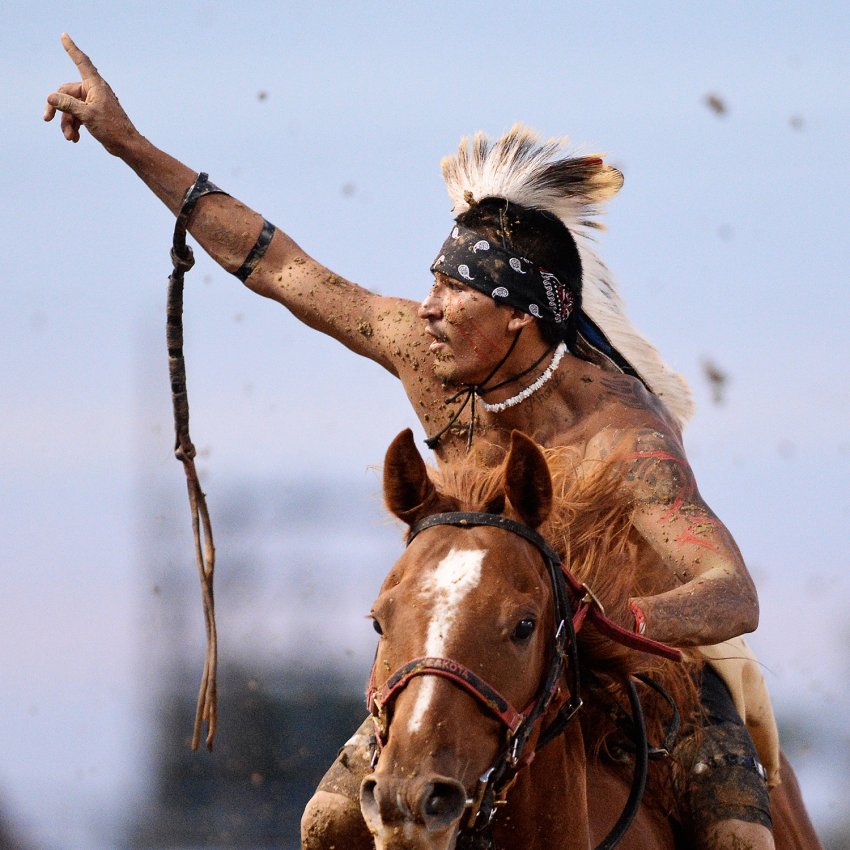
Once the teams hit Sheridan, a familiar weekend ritual began, with horse trailers pulled by large pickups rumbling onto the backstretch of the fairground. The better teams typically have better trucks; some of the second-tier participants arrive dragging rickety trailers that somehow made it all the way from reservations scattered across the Dakotas, Montana, and Washington.
During the race, Stan will stay with his family at the no-frills Bramble Motel. But most of the male competitors will sleep on cots in horse trailers lined up along the track’s backstretch. As the sun arcs down, the scene is like a football tailgate, the smell of grilling burgers and hot dogs wafting through the twilight air.
Gilbert Ecoffey, burly and with a booming voice, goes by the name G.W. He’s a lifelong friend of Stan’s and arguably the most successful horse trainer on Pine Ridge. (Over the summer, he’ll clear $50,000 in Wyoming and Nebraska from conventional racing - the more familiar events in which horses and jockeys are loaded into a fixed starting gate.) G.W. embraces the demanding routines of caring for his dozen or so horses, in part because not long ago his life was a downward spiral of substance abuse. He bottomed out in 2015, when he was sentenced to 15 months at the Rapid City Community Work Center on a drug-possession charge.
“If I didn’t have a horse to wake up to every day, who knows where I would be,” he says. “Horses heal people - they are my sobriety. They understand and communicate with you, even if they can’t talk.” G.W.’s work back home starts before dawn, when he makes his way down a muddy hill from his trailer to the stable. “I could be having the worst day ever, but when I get in the barn the worries go away,” he says.
There’s no shortage of worry on Pine Ridge, home to sweeping plains, rugged beauty, and crushing poverty. Covering an area roughly the size of Rhode Island and Delaware combined, Pine Ridge is beset by high unemployment (80 percent, according to some estimates), rampant substance abuse, periodic waves of child suicide, and a life expectancy in the sixties. Calls to 911, which sometimes take an hour to respond to because of the vast distances, pile up on top of each other as the undermanned tribal police race from one emergency to the next.
The Brew Crew haven’t been immune. Stan tells me about the loss of two riders to suicide and another to prison. G.W. says Stan “has had a bad go with riders,” which to him is ironic, since Stan is “the most sober guy I know.” G.W., 30, considers him a role model, even though Stan is younger.
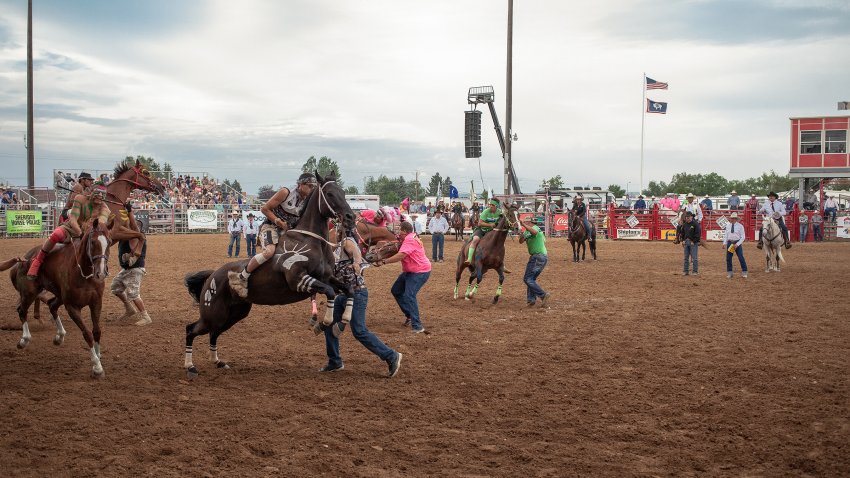
Stan is a full-time rancher, juggling the responsibility for 200 head of cattle of his own with the work he does on a larger reservation spread, all before he can “sneak in some relay training at the end of the day.” Horsemanship is in his genes, going back to a time when the Lakota roamed free, as legendary hunters and warriors dominating a vast region from the Badlands in the east to the Bighorn Mountains in the west.
Stan takes pride in continuing this legacy, and he finds peace in traditional Lakota practices like visiting a sweat lodge and participating in the Sun Dance every summer. Stan didn’t want to discuss the specifics of the Sun Dance, partly because it’s considered sacred, but the ritual reportedly involves fasting, intense prayer, daily sweats, and excruciating barbed piercings of the chest. Stan says it’s the hardest thing he’s ever done but adds that the ordeal is a small sacrifice compared with people “who experience pain every day when they wake up.”
Horse races are another connection to these traditional ways, but Indian relay isn’t just a quaint nod to history, like Civil War reenactment. It’s also an exciting competition. Stan’s father, Stan Sr., puts it best: “They should show Indian relay on TV before the Kentucky Derby, so people could see how fucking boring that is compared to this.”
The 20 teams in Sheridan will compete in four qualifying heats, featuring five teams each, on Wednesday, Thursday, and Friday night. Their combined times will be used to determine who races in the championship and consolation heats on Saturday.
The Brew Crew arrived in a bit of turmoil. A few weeks ago, Sylvan Brown, the team’s best rider, quit after Stan yelled at him for participating in a dangerous local backcountry race despite being told not to. Stan replaced him with Brian Beetem, who has the short stature and wiry build of a gate-race jockey, which can be a handicap in relay. Taller riders have an easier time mounting horses, and bigger, stronger riders can more easily bring their horses to a stop during exchanges.
Still, the Brew Crew have a solid first night in Sheridan. With Brian riding - and with Stan and two of his teammates, Tre Goings and Will Brewer, holding and “mugging,” or catching the horse while the rider dismounts - the team finishes behind River Road, from the Crow Agency, and is in fourth place overall.
The next day, Stan and G.W. get their teams going early. There’s something enchanting about dawn at the track, with the smell of manure almost sweet in the fresh morning breeze. Stan is always eager to be among the first to run the horses, but especially so today, because he’s looking forward to taking Ella, Parker, and Kye to a water park, to escape the afternoon heat before the evening’s races.
After the morning chores are done, the backstretch grows quiet as some nap and others head for town. By afternoon the track is buzzing again, with the teams and their families converging on the horse barns. While the day moves toward twilight, William “Shorty” Brewer - Stan’s uncle and an elder Pine Ridge horseman - sits in his lawn chair beside his pickup truck, holding court as people come by to chat. Kids from Pine Ridge walk up to say hello.

Shorty is known for organizing multi-day memorial trail rides to sites of historical significance to the Lakota. He tries to provide any interested kids with horses and logistical support free of charge. Many of those stopping by recently participated in his Little Bighorn ride, during which dozens of children and adults rode nearly 70 miles from Ashland, Montana, to Little Bighorn, the site of Custer’s Last Stand. After a day in the saddle, they gathered around a campfire while elders discussed what they’d seen.
“Shorty would give the shirt off his back to help kids,” Stan says, and he knows what he’s talking about. For most of Stan’s youth, his father was in jail, and Shorty stepped in as a parental figure, patiently agreeing to take Stan on rides almost every time he asked. Shorty knows the challenges and temptations the kids will need to overcome, having seen it all on the front lines of tribal law enforcement. He decided more than 20 years ago that his own life would work much better without alcohol.
Sheridan is only about an hour down Interstate 90 from the Little Bighorn site, and memory of the 1876 battle is felt throughout rodeo weekend. The Indian Wars seem surprisingly relevant when direct descendants of the adversaries are gathered on formerly contested land.
The contrast between the portion of the backstretch near the stables, where Native American relay teams gather, and the interior of the track, where the predominantly white rodeo participants park their trailers, is stark. The infield is full of fancy RVs, along with new pickups that pull shimmering trailers. While many rodeo riders wear crisply pressed shirts plastered with sponsors, the Native Americans wear a random assortment of T-shirts and jeans before changing into the tribal regalia that they’re encouraged by event organizers to wear during races, complete with headdresses and face paint.
One section of bleachers stands out from the rest: the Gold Buckle Club, where men in expensive boots and creased jeans mingle with attractive women in sundresses. These are the moneyed descendants of the people who won the West, and they inhabit a different world than the Native Americans. Free drinks flow without pause from a well-stocked bar; wads of twenties change hands as club members bet on the relay riders, shouting encouragement to their favorites.
Shortly before Stan and the Brew Crew head off to get their horses for tonight’s racing, Stan ducks into his trailer and emerges holding a coffee mug filled with sage. He lights it and quietly moves to each of the horse stalls, guiding the smoke toward the horses, his rider, and the rest of the team. He mouths a few words of prayer.
Brian’s goal this time out is to improve his exchanges, getting off one horse and onto the next at a speedier clip. As always he’s worried about his size. “I am a little guy, and I have to stop these fuckers,” he says amiably. But real worry marks his voice. He walks off to do some stretching.
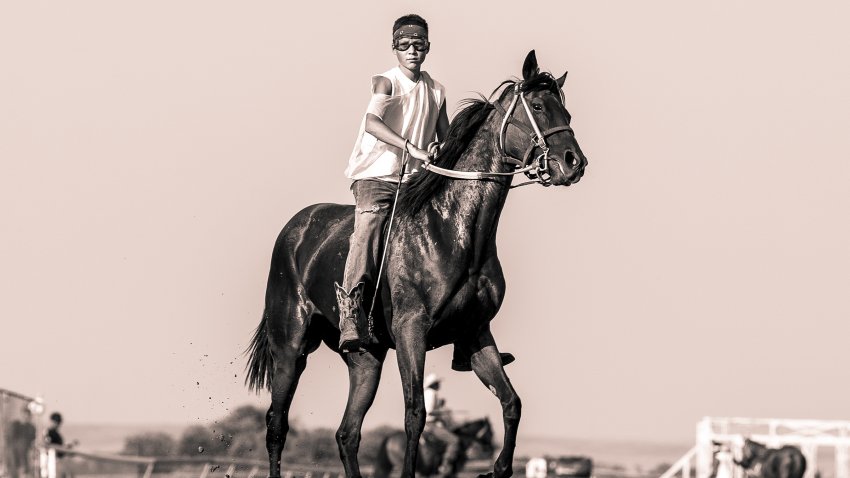
The heat of the afternoon is giving way to a cool, breezy evening. The grandstands fill with men in boots and jeans, some of them accompanied by their wives and little boys in cowboy garb. Teenagers screech as they ride the Kamikaze at the nearby carnival, the sun setting over the Bighorns to the west, the smell of Polish sausage filling the air.
Prerace festivities begin with a display of horsemanship featuring active-duty members of the U.S. Army First Infantry Division’s Mounted Color Guard dressed as 19th-century cavalrymen. The captain of the Lakota Warpath relay team, 36-year-old Don “Cubby” Ghost Bear, served combat duty with this division in Iraq, and now he’s trading war stories with the color guard’s first sergeant. Later, back at his stall, Ghost Bear carefully paints his horses with the initials U.S. - the label once branded on the sides of military horses - to honor his ancestors, who “were the only ones able to steal horses from the cavalry.”
Eyes turn skyward when Toby Keith’s “Beer for My Horses” transitions to the Lee Greenwood chestnut “God Bless the U.S.A.” A double-amputee Army veteran descends from a cloudless sky under an enormous red and white parachute, a huge American flag trailing behind him. The ceremonies conclude with a prayer, and the crowd erupts as the first heat of five teams gets underway.
The Brew Crew enter the second night of racing in good shape; another strong performance will keep the team in line for a spot in Saturday’s championship. But this time, Brian’s size finally trips him up.
He gets off to a strong start, smoothly mounting the thoroughbred Fried Rice and rocketing off the line before some of the other riders have even gotten on their horses. The plan is to have him ride the temperamental but powerful Steals the Thunder for the second lap.
Everything seems to be going well as Fried Rice explodes down the backstretch, building a sizeable lead. When Brian guides him around the tight turn into the homestretch, there are no other horses in sight. Will, the mugger, jumps up and down, signaling horse and rider to pull off into the team’s box for the first exchange.
But Fried Rice never breaks stride, ignoring Brian’s reins and shooting down the homestretch as if gunning for the finish line. The crowd gasps, and with good reason: the failed exchange just ended the Brew Crew’s chance for a spot in the championship. It means automatic relegation to the bottom of the standings.
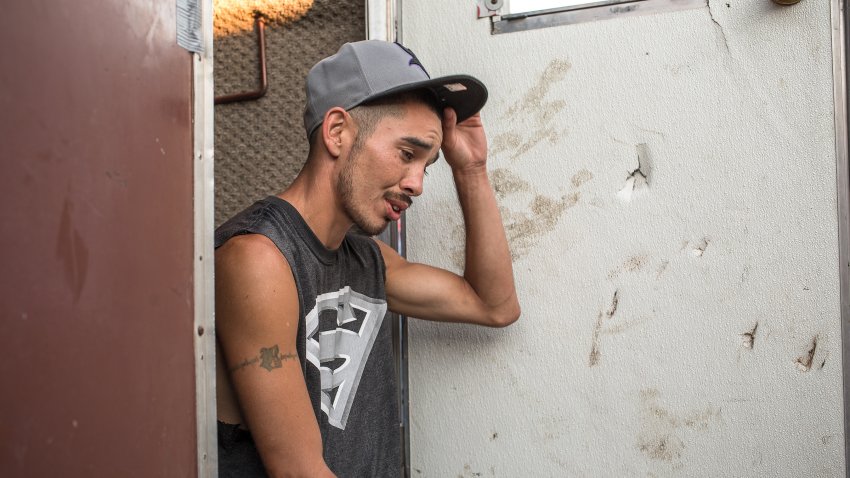
Stan is stunned. Fried Rice has never bolted like this before, and Stan wonders if perhaps he “smelled the finish line and thought it was a gate race.” He can’t mask his frustration. “That’s relay,” he says. “But of all the fucking places.”
A breakdown of the weekend’s earnings shows that no one is getting rich in this sport. Stan spent roughly $500 on fuel, $375 for his family’s motel room, $500 for the entry fee, $400 for grain, and $750 for the team’s food. The team as a whole would receive about $1,500 in payouts. After giving roughly $500 to his rider and the other two team members, Stan is left with only $1,000 to help defray his own expenses.
There are two small circular pins - with smiling young faces on them - attached to the driver-side visor in Stan’s pickup truck. “Can’t talk to them no more,” Stan says when he sees me looking. It’s an August day not long after the Sheridan race, and we’re riding around Pine Ridge. The pins show the faces of two of his best friends, riders Lawrence Harvey and Hermis Tall.
There are the usual explanations for why these talented athletes chose to kill themselves: broken families, poverty, alcohol. There may be another reason, though. Like soldiers who get addicted to the intoxicating adrenaline that comes from combat, some relay riders thrive when they’re on the road competing but become dangerously vulnerable to purposelessness when they’re back on the reservation.
G.W. later tries to explain, sounding resigned. “You could win everything clear across the U.S., but back here it’s always the same feeling,” he says. “It’s a sad place and always has been,” noting that just down the road is Wounded Knee, where hundreds of Lakota, including women and children, were massacred in 1890.
Winters are rough on Pine Ridge and can increase the sense of desolation. Powerful winds roar through from the west; ominous signs on Interstate 25 warn of gusts topping 60 miles per hour. The blizzards are especially dangerous because of housing conditions: many people live in ramshackle trailers perched along remote dirt roads. Nick Campbell, an Oglala Sioux tribal-police officer, calls the forbidding winter months “suicide season.” During the winter of 2015–16 alone, nine young people between the ages of 12 and 24 killed themselves, and another 103 made attempts.
As I ride with G.W. up a long road toward a series of trailers that belong to the Jumping Eagles, a prominent Pine Ridge horse family, he tells me about Harlie Jade Tall Jumping Eagle, a 15-year-old girl with a playful smile. G.W.’s voice becomes a whisper as he points to the place where Harlie ended her life in March of 2015.
The following year, Stan’s friend Lawrence Harvey - a 23-year-old natural athlete who once missed a relay exchange and then ran alongside the galloping horse for a quarter of a mile - took his life. Stan named his second son, Kye Lawrence, after him.
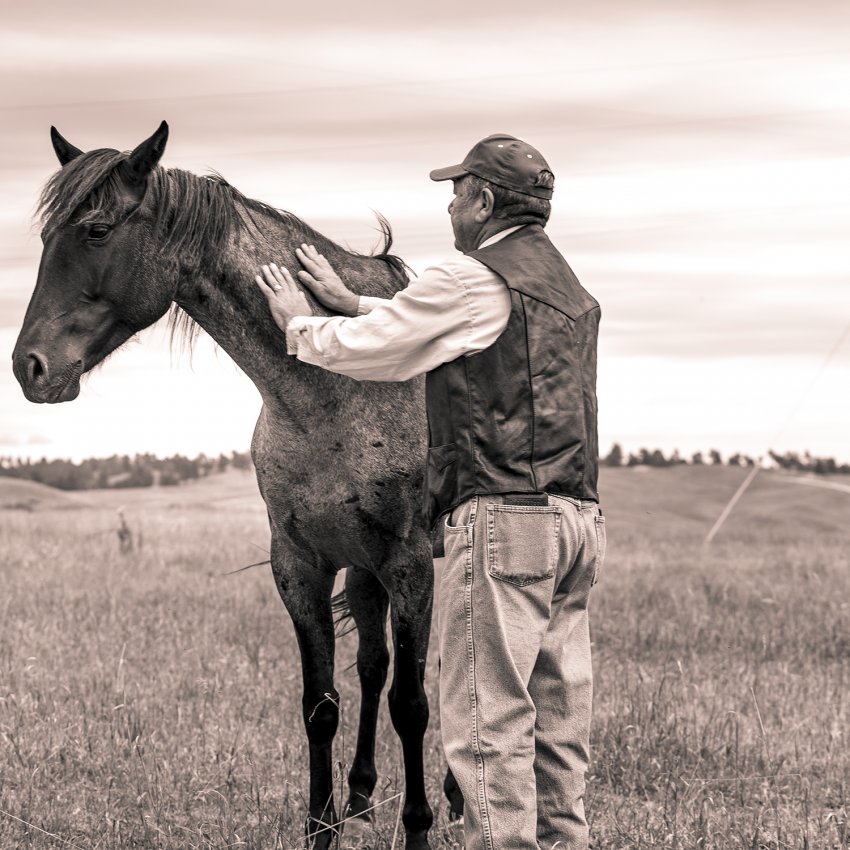
While Lawrence was a strong horseman, neither he nor any other modern rider compared to Hermis Tall, who was an all-time great. G.W. says Hermis “grew up on the back of a horse” and never really got off. Sometimes he would ride 20 miles into town for a pizza.
Hermis was raised only a few trailers away from Lawrence, on the same dirt road in Manderson, the village at the epicenter of Pine Ridge’s horse culture - a place where 20 to 30 communal horses wander around at any given time, like a living bike-share program.
Manderson is also one of the reservation’s more dangerous areas, and driving through it on a weekday afternoon can be staggering. People of all ages spill out of dilapidated trailers in various stages of inebriation, some shouting and carrying on conversations with themselves. Tribal police approach it with trepidation, aware that reinforcements may be an hour away.
G.W. explains the challenge of growing up poor in such a remote place. A person raised in a housing project in New York City might have it bad, but at least they can walk out their front door and find a convenience store nearby. In Manderson, he says, “you have to drive 18 miles for fast food.” The sense of being cut off, marooned on an island of poverty and depression, is palpable.
This is the world that Hermis Tall was never able to escape. He was capable of warmth and affection, but there was a wildness that neither his friends nor his horses could tame. Like too many young people on Pine Ridge, he discovered alcohol early and was drinking steadily by the time he was 11. He was raised by his grandfather in a trailer crammed with up to a dozen extended family members.
But Hermis always had horses. He spent most days with his friends traversing the nearby hills, jumping into Mercy Creek from their galloping mounts and sometimes heading into town on horseback for a hot lap - an effort to bait patrolling tribal police before scattering into the backcountry. “We never got caught,” says Roger Jumping Eagle, G.W.’s 25-year-old relay rider. Racing takes him back to those carefree days. “I get that wild-kid feeling again,” he says, “that adrenaline rush.”
Riders like Roger and Hermis loved to compete for bragging rights at local races, like NBA stars who gain street cred for playing pickup games on playgrounds. One such race goes for a hundred miles across a huge swath of Pine Ridge, with horses switched out at designated checkpoints along the way. Hermis, who had an encyclopedic knowledge of the backcountry, excelled at it.
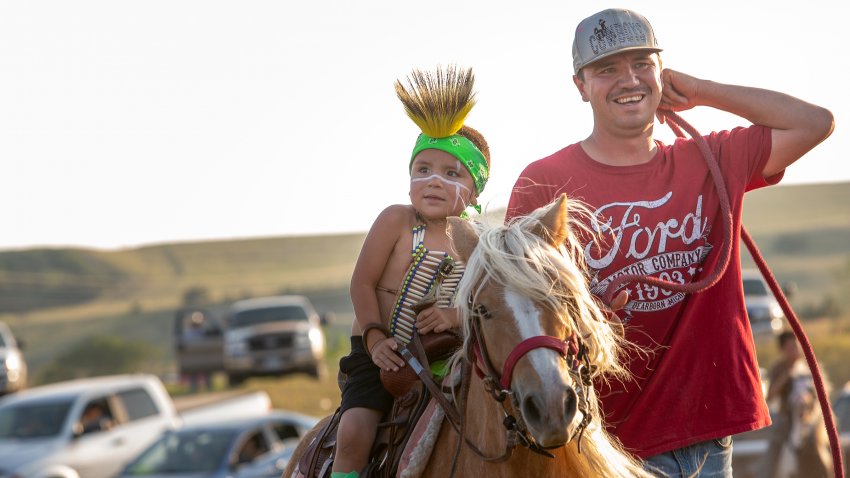
Foremost among the local contests are the notorious suicide races, which entire towns turn out to watch. Anywhere from around 12 to 18 riders start, but usually only a handful finish after riding over rugged terrain, up and down hills, and across country roads. For a few brief moments, riders feel weightless - careening through the reservation’s grassland, adrenaline surging, temporarily able to shed their worries about money, the well-being of loved ones, volatile relationships, and uncertain futures. Unfortunately, the highs quickly dissipate.
Just weeks before he took his life, Hermis led the Brew Crew to their third consecutive world championship in Sheridan. Stan showed me YouTube clips of Hermis jumping off his horse while it was still moving and then leaping over the hindquarters and onto the back of the next one. “Ass jumping,” as Stan calls it, takes incredible athleticism. “Not a lot of people can do that,” he says, “let alone in the world championship on the last exchange.”
On August 25, 2016, Hermis had spent much of an unseasonably cool day drinking. His friend Jay, a bronc rider, sensed that he was headed to a dark place, in part because he’d lost a brother to suicide months earlier and had recently gone through a nasty breakup. Jay tried to calm him down, but it didn’t work. Hermis jumped on his horse and rode off into a valley not far from his trailer home. He slid a noose around his neck, tied it to a tree limb, and kicked the horse out from under him.
For years now, Shorty Brewer and his brothers have put on local races at Pine Ridge, coinciding with the annual powwow during the first weekend of August. The powwow is the biggest occasion of the year, a four-day celebration of Lakota history combined with carnival rides, sports, a rodeo, and a nighttime event featuring traditional costumes and dancing. The Brewer brothers’ races have the feel of a community picnic. Some families arrive in vehicles showing signs of damage from a recent hailstorm, their trunks filled with lawn chairs and blankets.
Ella’s parents, Mona and Ted, are on hand for the 2018 powwow. Ted, a massive man wearing an Oakland Raiders T-shirt, lifts little Kye, engulfing him in his thick, heavily tattooed arms. Ted is especially proud of a chest plate he made for Parker to race in, using hair from Parker’s favorite pony, Daisy.
The cool and overcast afternoon features all kinds of races, most designed more for family fun than intense competition. Everyone seems happy, transported far from worry and sadness, though shadows can feel inescapable.
Just across the highway, an eight-year-old named Jayla Rodriguez, a beautiful girl with an infectious smile, was mauled to death in 2014 by one of the reservation’s ubiquitous packs of wild dogs. Ted shakes his head when the attack is mentioned, lamenting the fact that there are some streets you can’t walk down for fear of feral dogs, before turning his attention back to the races.
Ted is imposing now, but he was a vulnerable kid when he attended a predominantly white high school in neighboring Rushville, Nebraska, where he was taunted because of his Native blood. Decades later, returning to Rushville, thick with muscle and hardened by jail time in California, Ted confronted one of his high school tormenters. “You remember me?” he said. His antagonist said no, to which Ted replied, “Well, I remember you.” Sensing the menace, the man broke down in tears, which was probably the only thing that saved him from a beating.
As Ted relaxes in his lawn chair, Parker and Kye’s other grandfather, Stan Sr., is preparing for his race. A sinewy horse trainer, Stan Sr. looks like he was born in boots and jeans and has subsisted on cigarettes and caffeine ever since. Stan gives his dad some last-minute advice, and Stan Sr. goes on to have the most exciting race of the day, falling just short in a duel with an old friend of his. Dismounting, still breathing heavily, Stan Sr. can’t wipe the smile off his face. For a few minutes, he was no longer a creaky 54-year-old man but a young boy, riding his pony across the same fields his ancestors had ridden generations ago.
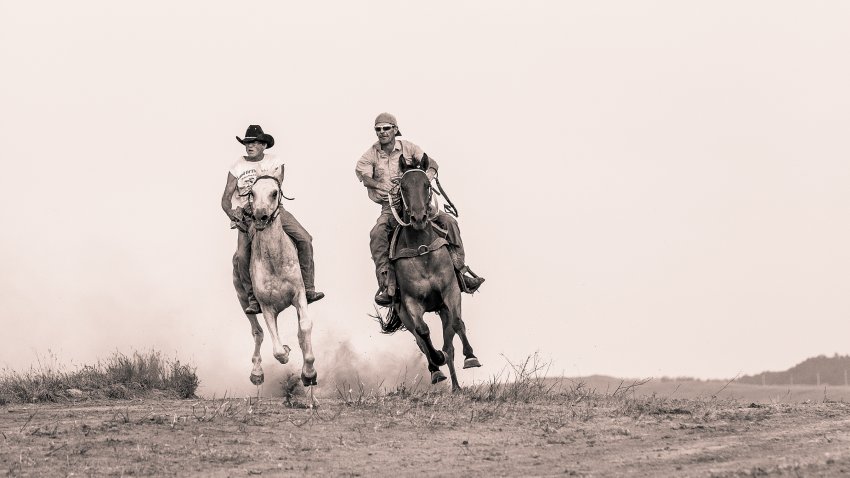
Shorty oversees the races in his usual understated way. He’s quiet by nature, but words spill out when the subject turns to the children who are taking turns riding his pony, Suzie. “Just putting a smile on their face is what keeps me going,” he says, adding that the hardest part of his time with kids is when it comes to an end and he has to tell them, “It’s over, you gotta go home.” Their homes can sometimes be scary places, overflowing with rowdy adults who are drunk or high.
The relay races on powwow weekend are held at Three Moccasin Park, a classic bush track. There are a few rickety wooden bleachers near the finish line. Otherwise it’s just a dirt oval with an elevated wooden announcer’s platform in the middle of an infield of overgrown grass. There are plenty of whites from Nebraska interspersed among the Native families, some on the bleachers and others sitting on the beds of pickup trucks or under portable tents. In Loving Memory T-shirts, with the face of a child or teenager on them, are common among the Lakota in the crowd.
Clouds move in, delivering relief from the unforgiving sun, and it looks like rain may be on the way. As usual, Ella has arrived early and staked out a good infield spot near the starting line, rolling out a blanket for Kye and unloading an assortment of toys to keep Parker busy before his pony race. Her parents join her, as does her brother and his family, with a cooler full of soda and sports drinks. Most people seem to be obeying the reservation’s prohibition of alcohol, though the doors of the car next to Ella’s blanket open periodically, releasing a powerful cloud of weed smoke every time.
Ella gets word that the kids’ pony race is next, and she has to scramble to dress Parker and apply war paint. Parker betrays no signs of nerves as adults shout his name when he passes by on Daisy.
The pony races last around 50 yards, with an adult leading the pony while the child rides. Parker wins, assisted in no small part by Stan’s speed as he leads Daisy at a full sprint. Stan, Ella, and Stan Sr. are beaming as Parker rides over to the bare-bones winner’s circle for a victory photograph. After the ceremony, he hops off and hot-walks Daisy, guiding her in tight circles to cool her off, mimicking the adult relay teams who do the same thing with their massive thoroughbreds.
Soon it’s time for the Brew Crew’s preliminary heat. Confidence is high for this race, which is against middling competition on the home track. But when the horn sounds, the Brew Crew implode. Substitute rider Roger Jumping Eagle’s horse gets bumped during a chaotic start, panics, and jumps off the track. Roger is thrown, suffering a concussion.
And that’s it. A team that had until recently dominated the relay circuit couldn’t get past the starting line.
As Ella and her father quietly take down the tent, she warns me that Stan will probably be in a bad mood. When Parker and Ella approach the team, I follow along, relieved when Parker breaks the silence. “How did Brew Crew do, Daddy?” he says cheerfully.
“We sucked, son,” he says. With a bitter smile directed at me, he shakes his head. “This is the worst year we’ve ever had. Three straight world championships and now 17 dead lasts,” he says with some exaggeration. Half-wondering if I’m a jinx, he adds: “Fucking media.”
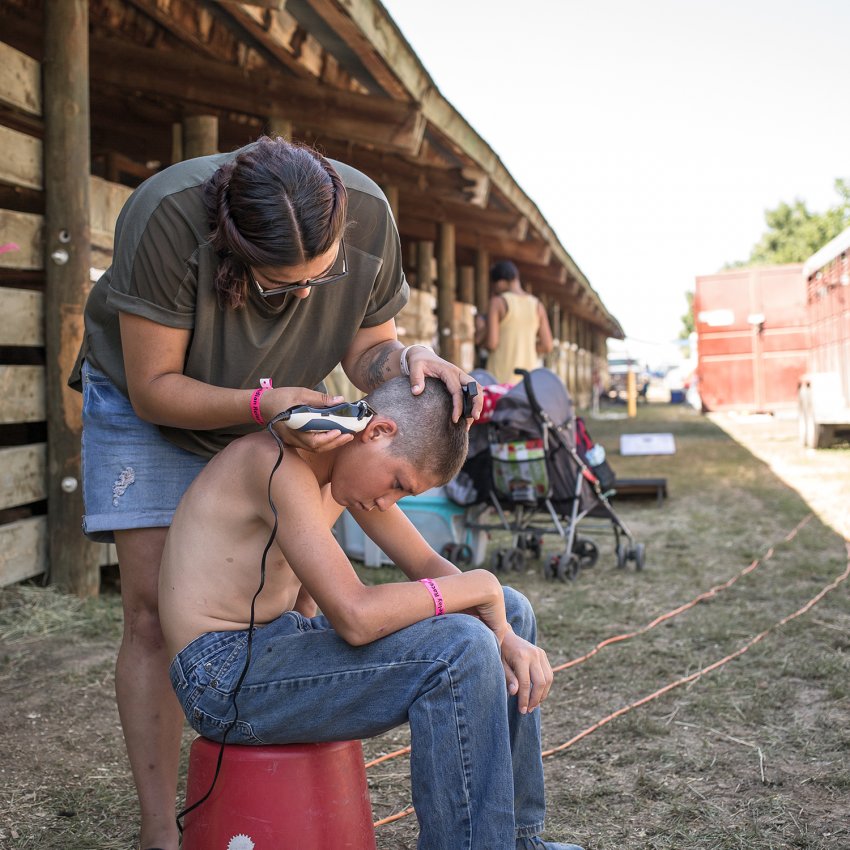
George Strait’s “The Cowboy Rides Away” plays over the PA as the last tents are struck and pickups exit the track, leaving clouds of dirt. The afternoon is starting to feel something like a vacation ending too early.
As the track empties, one boy remains: Kayden Brings Plenty, an earnest 14-year-old rider who Shorty introduced to racing years earlier. He pulls his horse alongside Shorty.
“Hey, Grandpa Shorty,” he says, “when are we riding next?”
For the Brew Crew, the season’s final race - with its biggest purse, $75,000 - takes place in late August at Canterbury Park, outside Minneapolis.
Hosted by the wealthy Shakopee Mdewakanton Sioux Community, this is a popular, invitation-only event. The Mdewakanton are known for treating participants well, covering travel expenses and providing goody bags, welcome dinners, and generous payouts. A few teams have driven 25 hours from as far away as Washington State.
Competition will be fierce, but the Brew Crew arrived with renewed stability - Sylvan has been riding for the team again - and momentum, having recently won smaller races in Parshall, North Dakota, and Lower Brule, South Dakota.
Canterbury Park feels a world away from anywhere else the Brew Crew have raced this summer. On a cool and pleasant Thursday night, the stands are packed with an affluent suburban crowd - golf shorts and shirts are more common here than cowboy boots and hats. The bars are stocked with beers and tasty food, and there’s an enormous children’s play area. No surprise, this is Ella’s favorite destination of the summer.
Fourteen teams made the trip to Canterbury, where they’ll compete in two preliminary heats of seven teams each on Thursday and Friday nights to qualify for the championship on Saturday night. The Brew Crew draw the second heat on Thursday. Canterbury is a mile-long track - as opposed to the half-mile courses the team usually sees - and Stan has brought different horses with him this weekend, including three he recently purchased in Nebraska for $2,000.
As Stan leads his team onto the track, I find my way back to Ella and the boys. Parker, amped by the excitement of the impending race, is desperate to find a pony to ride, and Ella snaps that if he asks again, he’ll have to do a time-out. He’s soon distracted by his father and the rest of the Brew Crew as they pass by, dressed in lime green shirts, jeans, purple headbands, and canvas vests. Parker waves and shouts “Hi, Dad!” and “Let’s go, Brew Crew!” as they move by.
The race gets underway. Unfortunately for Stan, one of his new acquisitions, Kitty Blonde, is slow over the course on the first mile, falling far behind and causing the Brew Crew to finish a dismal sixth out of seven teams. They’ll need a strong finish on Friday night to have a chance of making the final.
As I approach the stalls with familiar trepidation, Stan is letting loose a torrent of f-bombs, angry at the performance of his new horse and at Sylvan for riding too cautiously.
The next morning I meet Stan, his family, and the three boys from his team at the Canterbury Inn and Suites for an outing to the Mall of America. Stan hands them each some spending money for the afternoon, for which they offer grunts of gratitude.
Stan is wearing a purple Vikings T-shirt along with a Sheridan World Championship belt buckle, while the boys are in Pine Ridge teen attire, which seems to borrow heavily from hip-hop: flat-brimmed caps and low-slung jeans.
As we wander, I ask Stan what he sees in Sylvan, who hasn’t ridden well or shown much emotion at the races I’ve been to.
Stan makes it clear that he takes pride in having mentored Sylvan. “Sylvan has always been a rider, since we carried him crying onto a horse,” he says. Stan explains that while Sylvan is quiet and can be a bit awkward socially, he has the hunger and competitive spirit necessary to win. He cites Sylvan’s work ethic and the fact that he woke up early throughout the spring to ride six horses for their daily workouts.
As I watch Stan and Ella guide Parker and Kye’s stroller through the sea of mall humanity, I wonder if this is disorienting for them. Does visiting the cathedral of consumerism make it more difficult to return home, where the only shopping available is at the Sioux Nation Superstore or a Family Dollar in nearby Whiteclay? This leads me to wonder - given all the challenges of reservation life - why so many stay.
The answer always involves some variation of a powerful idea: family.
As Stan has explained, many Lakota grow up on the reservation in small trailers or houses packed with people. While this is not always easy and can lead to problems, it’s a comfort for those fortunate enough to be surrounded by loved ones. Another factor is a spiritual connection to the land - a small parcel they can call their own. Though Pine Ridge is poor, it’s beautiful, too, and it’s sacred to those who practice traditions like sweats and Sun Dances. As Stan reminds me, the Lakota are “proud, even if we are in a bad way and in a society that has been trying to kill us off for over a hundred years.”
The Brew Crew return to the track in late afternoon to begin preparations for the evening’s races. Stan has made some substitutions in his horse lineup, replacing two underperformers with recent acquisitions What’s in the Box and Significat. He doesn’t know what to expect, but facing elimination, he has no choice but to take a chance.
As soon as the race starts, Sylvan weaves his way into the lead pack of seven horses. Omak Express, a strong team that came here from Washington, and Bad Nation, from the Crow Creek reservation in South Dakota, maintain a narrow lead as the riders pull into the first of two exchanges.
As the second mile begins, Stan’s decision to swap horses appears to be paying off, and Sylvan enters the second exchange well ahead of the field. He loses precious seconds changing horses, though, and he emerges in fifth place. He remains well behind the leaders for much of the final mile. Heading into the homestretch, Sylvan is mired in fifth, a seemingly insurmountable eight lengths short of the second-place finish needed for the Brew Crew to at least have a shot at advancing.
Ella and I are screaming, desperately trying to will the team to a miraculous finish. Suddenly, Significat finds another gear and begins to overtake the horses separating him from the leader. He noses into third as they charge down the stretch, hugging the rail, just behind the second-place horse, which veers to the inside, threatening to box him in.
Sylvan matches this move with a quick thrust to the outside, nearly colliding with the horse that had just cut him off, before thundering ahead to a second-place finish. It was a marvelous feat of horsemanship by Sylvan and a resounding show of heart by Significat.
Ella and Parker are beaming as we head to the barn to check in with the team. Everyone is smiling. They joke about replacing their Indian regalia with Viking horns tomorrow, to win over the Minnesota crowd.
Now there’s nothing to do but wait and find out which teams will advance. I say goodnight, and Stan assures me he will text as soon as he finds out if they made it.
I head to a nearby bar for a drink. I’m still there as the clock inches toward midnight, and there’s no word. Just when I’m about to assume the worst, I get a message.
They’re in.
To the crowd streaming into Canterbury Park on Saturday night, the Indian relay races are a fun sideshow. But to the families and friends of the participants, the nervous excitement is palpable. I watch Stan feverishly chew on a blue plastic seal from a water bottle. Ella says he didn’t eat or drink anything all afternoon.
Tribal drummers wearing ceremonial war bonnets play as the Brew Crew, clad in the usual fluorescent green shirts, take their position in the box and Sylvan rides to the starting line. Stan is using the same horses as last night, hoping they have one more strong performance in them.
The crowd is amped. While there’s no official betting on Indian relay - as a sport, it’s too unregulated - a voice on the loudspeakers announces that “side betting is highly encouraged.” Spectators seem more engaged with the relay races than the conventional gate races, another reminder that the sport has the potential to be bigger. “Cornhole and darts are on ESPN,” Stan said once. “Imagine what relay could do.”
Horses and riders finally converge on the starting line under a bloodred moon. After the start, with the horses accelerating toward the first turn, Sylvan pulls into the lead pack, where he remains for the first mile.
Racing comfortably in third place coming into the first exchange, Sylvan rides hard into the box, where the mugger, Will Brewer, jumps in place to guide him in. Sylvan leaps off the moving horse as Will corrals it and, with only a few steps, bounds onto the waiting horse, J.W. Red, to complete an exquisite exchange. This propels him into the lead as he approaches the first turn of his second mile. Sylvan pushes J.W. Red relentlessly and is ahead by ten lengths as he comes down the homestretch toward the final exchange.
Then things start to go wrong. After cleanly dismounting J.W. Red, Sylvan can’t jump onto Significat to start the final mile. Seconds go by as he tries - once, then again, then a third time - to generate enough thrust from his fatigued legs to make the leap. Other teams execute their exchanges smoothly and start thundering toward the first turn. Finally, Sylvan manages to get on, and with a slap from Stan, Significat is off, striding furiously ahead to rejoin the leaders as they round the first turn.
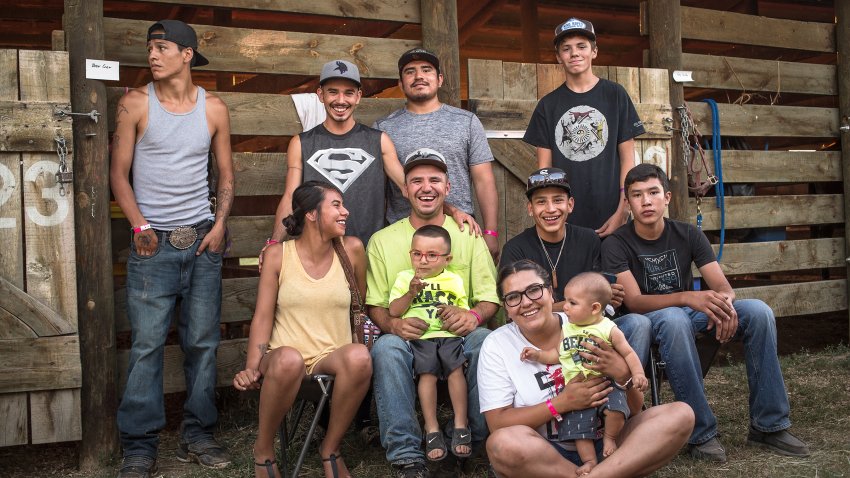
Significat keeps making up lost ground, and as they head down the backstretch, Sylvan and the rider from a rival team, Little Badger, are neck and neck, their horses’ heads bobbing past each other with every stride. Heading into the far turn, it’s a two-team race, and it hits us that the Brew Crew have a legitimate shot at winning.
As the announcer bellows “And down the stretch they come,” Sylvan extends his lead, putting five lengths between Significat and his pursuer. The finish is in sight. Whipping furiously with his right hand, Sylvan looks over his left shoulder and sees a third horse exploding into the fray, furiously closing the distance along the inside.
For the second straight night, Significat finds another gear. Horse and rider are indistinguishable, churning toward the finish line. They pull away, crossing it first by a comfortable margin.
For a brief moment time seems to freeze, the demons that have haunted the team over the course of a long summer exorcised by victory, an explosion of joy.
Sylvan and Will - often monosyllabic - are talking nonstop, their voices charged with the energy of their triumph. “We were only here to do one thing - win!” Will shouts. Ella greets Stan with a hug, and then they usher a jubilant Parker and a sleepy Kye toward the winner’s circle.
Later, pointing to the spot on the homestretch where Significat briefly appeared to falter, Stan says, “A horse’s fitness can get him there - but his heart is needed for the rest.”
Back at the stables, night has brought a crisp chill to the track. The young members of the Brew Crew, who usually move about with a bit of teenage slouch, are walking with their chests out.
Stan comes up to me as Parker jumps atop a nearby fence and starts whacking it with his whip, mimicking a rider.
“You know this is two years to the day since Hermis hung himself?” he says, reminding me that the team had been here when they got word of the suicide. “I know Hermis was there pushing Sylvan down when he was trying to mount Significat on that last exchange.”
I say I don’t understand exactly what he means but assume he’s suggesting Hermis was there helping his friend to the win.
No, Stan says. “I know he was messing with Sylvan and laughing up there.”
The more I thought about it, the more it made sense. This was not Hollywood, the guardian angel intervening to assure the success of his friends among the living.
No, it was more real.
Hermis was still there, still being himself. Still fucking with them. Still laughing.
Will Bardenwerper (@WBardenwerper) is a former U.S. Army infantry officer and the author of The Prisoner in His Palace: Saddam Hussein, His American Guards, and What History Leaves Unsaid.
This article originally appeared on Outside Magazine Online and is published here with permission.
Find more interesting stories in our section on Recreation & Lifestyle.
































